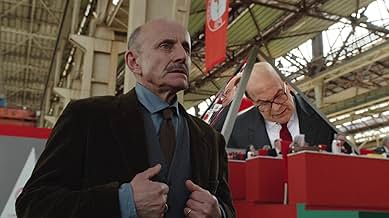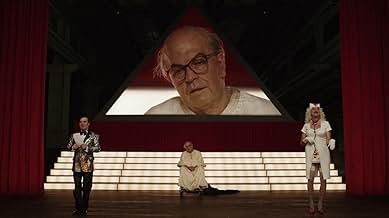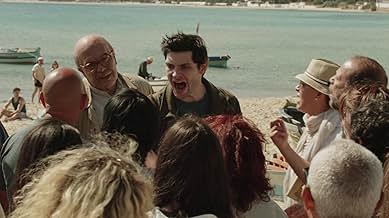Hammamet
- 2020
- 2h 6min
CALIFICACIÓN DE IMDb
5.8/10
1.9 k
TU CALIFICACIÓN
Agrega una trama en tu idiomaThe last year of Bettino Craxi's life, one of the most important and controversial Italian leaders of the 1980s.The last year of Bettino Craxi's life, one of the most important and controversial Italian leaders of the 1980s.The last year of Bettino Craxi's life, one of the most important and controversial Italian leaders of the 1980s.
- Dirección
- Guionistas
- Elenco
- Premios
- 8 premios ganados y 18 nominaciones en total
Opiniones destacadas
Main actor is great, movie has some nice parts but the pace is slow and expecially at the end loses grip. Maybe it needs a better cut. How accurate its' historically is also a nice question....
Uscito oggi. Visto al cinema.
Il film è fatto bene e le due ore scorrono veloci senza sosta. Tratta una parte della vita di Craxi che vi lascio scoprire quando andrete al cinema.
Favino è un attore dalle capacità ormai eccelse ed è un peccato che sia italiano, essendo il cinema italiano poco quotato all'estero: se fosse americano o francese avrebbe già vinto un Oscar o premi di rilevanza simile.
Gli altri attori ruotano tutti attorno a Craxi e quindi sembrano tutti secondari.
Il film è ben diretto, senza pause, ottima fotografia, ottime musiche.
Speriamo vinca molti premi.
Il film è fatto bene e le due ore scorrono veloci senza sosta. Tratta una parte della vita di Craxi che vi lascio scoprire quando andrete al cinema.
Favino è un attore dalle capacità ormai eccelse ed è un peccato che sia italiano, essendo il cinema italiano poco quotato all'estero: se fosse americano o francese avrebbe già vinto un Oscar o premi di rilevanza simile.
Gli altri attori ruotano tutti attorno a Craxi e quindi sembrano tutti secondari.
Il film è ben diretto, senza pause, ottima fotografia, ottime musiche.
Speriamo vinca molti premi.
If you don't know much about Bettino Craxi's life and political actions, it can be quite difficult to keep up with the story of this film. The story concentrates only on the character of Craxi and his point of view on the scandal that he was part of. Gianni Amelio tried to compose this film basically only from the thoughts and philosophical monologues of Craxi without any real plot or twist, which I must say became pretty tiresome after 60 minutes. It is obvious the whole film heavily relies on Pierfrancesco Favino as Craxi (who was simply masterful), but I wish it had more to it than just a great acting performance. I was also questioned by the mysterious character of the son of one of Craxi's former friends, who seeks truth about Craxi and also his own father. Perhaps this character should represent viewers or people affected by his actions also looking for the truth, but it felt like this character didn't really fit the whole atmosphere of this picture. If it had been at least 15 minutes shorter I would have mabe recommended it, but in spite of Favino's great performance this film feels quite forgettable.
If nothing else, this is one movie with "character".
Before sitting down to watch its first airing on Rai3, I peeked at the IMDb comments and the score, only to get confused. The awards and the praise just did not match with the overall score which was close to a 5. And the reviews suggested that one would not get much taste out of "Hammamet" unless one was particularly interested and invested in the history of the Italian left.
Well, I disagree.
I barely remembered the name Craxi and had no idea he had spent his last days in Tunisia. A quick search provided me with enough knowledge and trivia to place the narrative where it was intended to be.
I, too, am one who would enjoy to find the crucial foundations of a story (or a portrait) right within the movie itself, but let's face it: Times have changed. The way we access and enjoy movies has changed. The viewer may at times be expected to interact with the film in ways that are not limited to looking at a screen.
With a bit of leg work, one can get into Hammamet, which is quite rewarding given that the director has really given thought on how to construct solid scenes focusing all the time on the contrast between how the world sees a man and how the man interprets his very own self.
The director has made the touches to convert Craxi into a cinematical creature, a man of hopeless yet endless power plays, not as unlikable as actual moguls like Harvey Weinstein but somewhat more crude-yet-real than Citizen Kane.
A bit of abstraction, some escapism and lots of ego - be they capitalist or socialist, this is how almost any notable man can be portrayed.
The fact that this movie was shot only 20 years after Craxi's death makes it more interesting. It is a "period piece" in a way, but not so much as the gap between the actual thing and its cinematic interpretation ain't huge.
I particularly enjoyed the choices of songs used in the movie. The scene where his son played the guitar and song "Piazza Grande" was a delight. Delicate choice of Italian culture from not so long ago, including even tidbits from dubbed Hollywood movies he watches on Italian channels via satellite.
Reckless bravery... This is what I would call the director's choice on certain things, and also what I would call Craxi's involvement with money and politics.
The revenge-seeking son of his late friend disappears in the desert, just like that, defeating the very basic concepts of time and space? Really? That was a dare.
Reducing crimes of fraud into mere "naughtiness" by starting and ending the film with images of a child Craxi? Wow! Name a politician of my own times, and I'd get furious with such whitewashing! Yet, as a simple and functioning explanation to whatever complicated stuff went on in real life, yes, I will take it within the context of this film!
The Fellini-esque scarf worn by the protagonist as he walks barefoot on top of the Duomo in his dream, the way his daughter takes him to his lover... My, those were pretty notable scenes in very different ways.
As the doctor says regarding another character: "I malati di mente non guariscono perché non sono malati." (Mental illnesses don't get cured because they are not illnesses.)
This was a strange, powerful and kind of arrogant film. I'm glad I saw it.
Before sitting down to watch its first airing on Rai3, I peeked at the IMDb comments and the score, only to get confused. The awards and the praise just did not match with the overall score which was close to a 5. And the reviews suggested that one would not get much taste out of "Hammamet" unless one was particularly interested and invested in the history of the Italian left.
Well, I disagree.
I barely remembered the name Craxi and had no idea he had spent his last days in Tunisia. A quick search provided me with enough knowledge and trivia to place the narrative where it was intended to be.
I, too, am one who would enjoy to find the crucial foundations of a story (or a portrait) right within the movie itself, but let's face it: Times have changed. The way we access and enjoy movies has changed. The viewer may at times be expected to interact with the film in ways that are not limited to looking at a screen.
With a bit of leg work, one can get into Hammamet, which is quite rewarding given that the director has really given thought on how to construct solid scenes focusing all the time on the contrast between how the world sees a man and how the man interprets his very own self.
The director has made the touches to convert Craxi into a cinematical creature, a man of hopeless yet endless power plays, not as unlikable as actual moguls like Harvey Weinstein but somewhat more crude-yet-real than Citizen Kane.
A bit of abstraction, some escapism and lots of ego - be they capitalist or socialist, this is how almost any notable man can be portrayed.
The fact that this movie was shot only 20 years after Craxi's death makes it more interesting. It is a "period piece" in a way, but not so much as the gap between the actual thing and its cinematic interpretation ain't huge.
I particularly enjoyed the choices of songs used in the movie. The scene where his son played the guitar and song "Piazza Grande" was a delight. Delicate choice of Italian culture from not so long ago, including even tidbits from dubbed Hollywood movies he watches on Italian channels via satellite.
Reckless bravery... This is what I would call the director's choice on certain things, and also what I would call Craxi's involvement with money and politics.
The revenge-seeking son of his late friend disappears in the desert, just like that, defeating the very basic concepts of time and space? Really? That was a dare.
Reducing crimes of fraud into mere "naughtiness" by starting and ending the film with images of a child Craxi? Wow! Name a politician of my own times, and I'd get furious with such whitewashing! Yet, as a simple and functioning explanation to whatever complicated stuff went on in real life, yes, I will take it within the context of this film!
The Fellini-esque scarf worn by the protagonist as he walks barefoot on top of the Duomo in his dream, the way his daughter takes him to his lover... My, those were pretty notable scenes in very different ways.
As the doctor says regarding another character: "I malati di mente non guariscono perché non sono malati." (Mental illnesses don't get cured because they are not illnesses.)
This was a strange, powerful and kind of arrogant film. I'm glad I saw it.
Only human drama, when you talk about a polician you must talk about his political acts.
This film it's a not-storical narration based just on the ideas of the daughther, a woman that is never been objective. And we can understand her, but not who exploit her.
The damage that italian politic called Craxi (not nominated in the film but too easy to recognize) come out in the scandal know as "tangentopoli" is really very hard to forget and it's incredible like a movie can ignore what's happened in the latest 80's end early 90's.
Craxi wasn't the only guilty, that's sure. But this is never been a reason for absolution.
Favino it's a great actor, and all the cast is very good but in this kind of movie we can't close up on the artist,
This film it's a not-storical narration based just on the ideas of the daughther, a woman that is never been objective. And we can understand her, but not who exploit her.
The damage that italian politic called Craxi (not nominated in the film but too easy to recognize) come out in the scandal know as "tangentopoli" is really very hard to forget and it's incredible like a movie can ignore what's happened in the latest 80's end early 90's.
Craxi wasn't the only guilty, that's sure. But this is never been a reason for absolution.
Favino it's a great actor, and all the cast is very good but in this kind of movie we can't close up on the artist,
¿Sabías que…?
- TriviaThe disabled tank visited by Craxi and Fausto Is a real relic left in the desert near Hammamet. It is obviously an old Patton tank, presumably belonging once to the Tunesian army: as such, it couldn't have seen action in WW2, as Craxi recounts.
- ConexionesFeatures Traidora y mortal (1947)
Selecciones populares
Inicia sesión para calificar y agrega a la lista de videos para obtener recomendaciones personalizadas
Detalles
Taquilla
- Total a nivel mundial
- USD 6,434,874
- Tiempo de ejecución2 horas 6 minutos
- Color
- Relación de aspecto
- 1.85 : 1
Contribuir a esta página
Sugiere una edición o agrega el contenido que falta

Principales brechas de datos
By what name was Hammamet (2020) officially released in Canada in English?
Responda
![Ver Trailer [OV]](https://m.media-amazon.com/images/M/MV5BNDJmNGYyYzMtM2FmMy00ZjAwLWFkZWMtOWY5NjJlMTdhZjA3XkEyXkFqcGdeQXRyYW5zY29kZS13b3JrZmxvdw@@._V1_QL75_UX500_CR0)























